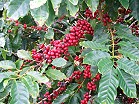 Coffee cultivation was first undertaken on a large scale by a small group of planters shortly after Costa Rica's independence from Spain in 1821. Earlier, in the first half of the 18th century Costa Rica's trials with coffee were unsuccessful. Relatively isolated, Costa Rica was on no important trade route nor was it a regular port of call. Furthermore coffee was processed in Chile and shipped to Europe where it was sold as Chilean coffee at prices which seemed exorbitantly high to the Cost Rican planters. However in 1845 a British ship owner gave them direct access to the English market elevating Costa Rica from the country with the worst economic conditions in Central America to far surpassing the other nations in prosperity. The British, in fact, were the principal purchasers of Costa Rican coffee until late in World War II.
Coffee cultivation was first undertaken on a large scale by a small group of planters shortly after Costa Rica's independence from Spain in 1821. Earlier, in the first half of the 18th century Costa Rica's trials with coffee were unsuccessful. Relatively isolated, Costa Rica was on no important trade route nor was it a regular port of call. Furthermore coffee was processed in Chile and shipped to Europe where it was sold as Chilean coffee at prices which seemed exorbitantly high to the Cost Rican planters. However in 1845 a British ship owner gave them direct access to the English market elevating Costa Rica from the country with the worst economic conditions in Central America to far surpassing the other nations in prosperity. The British, in fact, were the principal purchasers of Costa Rican coffee until late in World War II.
Coffea Arabica - Costa Rica grows Coffea Arabica considered to be the most flavorful and smooth of the varieties. Costa Rican coffee is high in both quality and caffeine content. The climate (abundant rainfall and sunshine) and soil (slightly acidic and enriched by volcanic ash) in the central valley has proven to offer near perfect conditions for its cultivation
Processing - Hand picked berries are trucked to processing plants where they are washed to remove the outer layer and to dissolve the gummy substance surrounding the bean. The beans are then laid out to dry in the sun in the traditional manner. The skin of the bean is removed by machine rubbing and the beans are sorted according to size and shape. Coffee is roasted before it is consumed which influences the taste by changing the bean both physically and chemically. During roasting caramelization occurs as heat breaks down starches in the bean changing them to simple sugars that begin to brown, changing the color of the bean. Dark roasts are generally smoother and have a more sugary flavor. Lighter roasts have more caffeine which results in a slight bitterness and a stronger flavor from oils and acids which would otherwise be destroyed by longer roasting..
Quality - Costa Rica is the only country where only the Arabica varieties, by law, may be grown. This is unique in the world. No other country regulates the quality of coffee as completely as does Costa Rica. It is truly the most carefully grown, harvested and processed coffee bean you may find.


